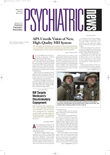Early career psychiatrists should pay close attention to the recent acceptance of psychosomatic medicine, also known as consultation-liaison (C-L) psychiatry, as a full-fledged subspecialty.
The field of psychosomatic medicine deals with psychiatric problems in people with other types of medical illnesses. It represents the interface between psychiatry and the rest of medicine.
(Other psychiatric subspecialties recognized by the American Board of Medical Specialties are geriatric psychiatry, child and adolescent psychiatry, forensic psychiatry, and addiction psychiatry.)
The process of approving psychosomatic medicine as a subspecialty was a long-fought battle. It involved attaining approval by APA, American Board of Psychiatry and Neurology (ABPN), and, in March, the American Board of Medical Specialties. The newly won ability to gain a certificate of added qualifications in this field will result in increased recognition and status for C-L psychiatrists, some 30 years after one of its forefathers, George Engels, M.D., first published his famous biopsychosocial model. The first ABPN certification examinations for added qualifications in psychosomatic medicine will be held in late 2004 or early 2005.
Subspecialty status will likely result in an increase in the number of C-L fellowship programs and positions open to formally trained C-L psychiatrists, according to Stephen Saravay, M.D., chief of C-L psychiatry at Long Island Jewish Medical Center.
Saravay believes that all psychiatric programs will need to expand to address the clearly defined educational requirements for residency and fellowship training in this area. Psychiatric centers without C-L programs will need to establish them to remain competitive, he said. “This is an exciting time for early career psychiatrists contemplating a future in psychosomatic medicine,” he said.
Adam Chester, D.O., an early career psychiatrist who has chosen psychosomatic medicine as his subspecialty, graduated from the Long Island Jewish Medical Center C-L fellowship in 1998. He was soon recruited by Flushing Hospital, a busy suburban hospital with an ambitious agenda for expanding psychiatric services.
Chester was appointed as chief of C-L psychiatry at Flushing Hospital and deputy head of residency training for Flushing Hospital and its larger sister hospital, Jamaica Hospital. He pointed out that his C-L training gave him a head start in developing his career. “The field is wide open, and a trained C-L psychiatrist can make a considerable impact on clinical care and teaching,” explained Chester.
Long Island Jewish Medical Center runs one of the largest fellowship training programs in C-L psychiatry in the country. It accepts five fellows annually and offers training in a variety of clinical areas—inpatient, primary care, cognitive therapy in the medically ill, program development, psycho-oncology, and neuropsychiatry.
“Subspecialty status for C-L psychiatry will lead to an expanded job market and new career opportunities for psychiatrists trained in C-L,” according to Maurice Steinberg, M.D., director of the C-L fellowship program at the hospital. He expects a significant increase in interest in C-L fellowships as graduates realize that in light of the availability of certification in this area, such training will now be a necessity for a career in C-L psychiatry. “We have already begun to see an increase in applications in recent months,” he said.
The field of psychosomatic medicine already offers numerous peer-reviewed journals such as Psychosomatics, Psychosomatic Medicine, General Hospital Psychiatry, International Journal of Psychiatry in Medicine, Journal of Psychosomatic Research, and Psycho-oncology.
There are also several comprehensive and well-established textbooks. The national organization representing practitioners in this field, the Academy of Psychosomatic Medicine (APM), and a variety of offshoots, such as the American Psycho-oncology Society, represent C-L psychiatrists and facilitate research.
C-L fellowship programs are listed on the APM’s Web site at www.apm.org. Accredited fellowship programs meet the standards of the APM, and the Web site is a good place for those interested in a career in C-L psychiatry to start their search. Job opportunities for C-L psychiatrists are also listed on this site. ▪
